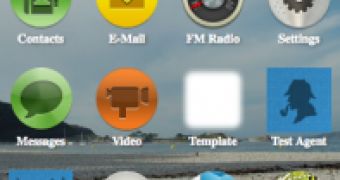For the past year or so, Mozilla has been working on its own mobile operating system, which went official several weeks ago as the Firefox OS, and which is now available for testing purposes on desktop PCs.
Fully-based on web technologies, the new platform is expected to open the doors to cheaper smartphones being launched on the market, starting with the next year.
The platform comes with support for all usual features on smartphones today, including dialing, messaging, internet browsing, web gaming, photo taking, video watching, music listening and the like.
The team behind Firefox OS, previously known as Boot2Gecko, has just announced a series of advancements in their pursue towards making the platform available commercially.
“The phone we’re working on will consist of 3 basic software layers: Gonk (kernal, HAL, and low-level components), Gecko (rendering engine, web APIs), and Gaia (HTML5 User interface layer),” a recent post from dknite reads.
“Our test approach is to create mochitests against the DOM and API layer, and run regression tests against a Jenkins CI system.”
The UI will see a more traditional acceptance approach, the blog post continues, explaining that testcases will be executed against Apps in an end-to-end scenario. The goal is to come up with webapps that can take advantage of B2G APIs.
Since testing is needed, the team managed to come up with Daily desktop builds of the new platform, currently available for download for all people to get for a spin. Nightly builds are available from Mozilla’s own servers for interested parties, on Windows, Mac and Linux machines.
“Refer to Gaia/Hacking for setup instructions. If you’re a web developer, you can use these builds to create and test your webApp against,” said blog post reads.
“If you’re looking to help do some testing, these desktop builds will also give you an immediate opportunity to play with and help us write testplans and file bugs. We encourage anyone interested to give the desktop builds a spin (available on Mac, Windows, and Linux), and get involved with the project!”
Those who would like to access more info on how they can get involved in the Development and Testing of the new platform should head over to this page on Mozilla’s Wiki.

 14 DAY TRIAL //
14 DAY TRIAL //